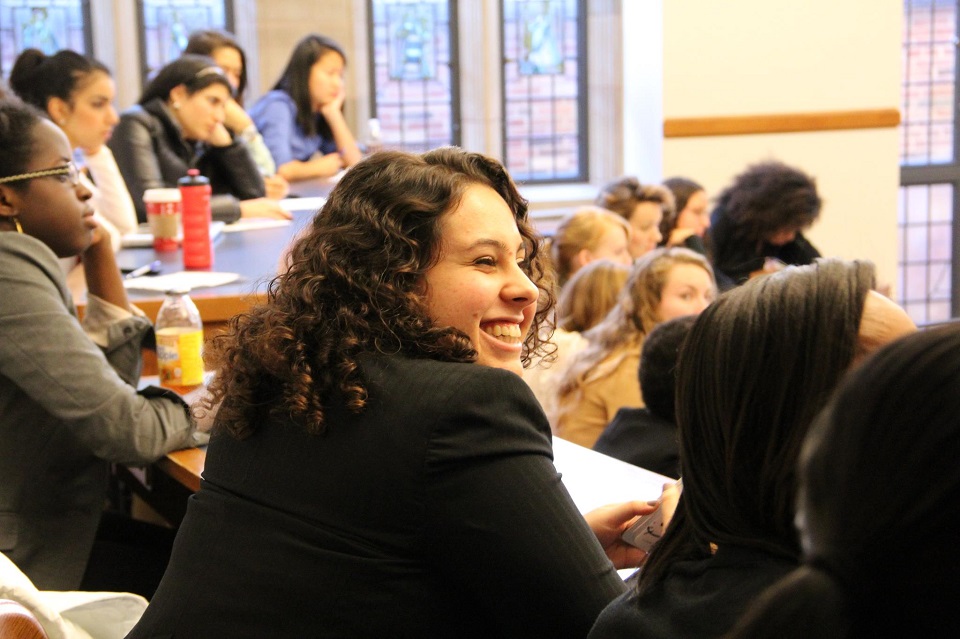Spotlight Series: National Leadership Council member and STS alumna, Michelle Hackman

Name: Michelle Hackman (STS 2011)
Job Title: Reporter, The Wall Street Journal
About Michelle: Michelle is a reporter in The Wall Street Journal’s Washington, D.C. bureau, where she covers immigration policy. Past beats have included education policy, health policy and campaign finance. Her work has appeared in many news outlets, including Neiman Reports, Vox and the Pittsburgh Post-Gazette. Michelle first joined the Wall Street Journal in 2016.
Education: Michelle received her B.A. in Political Science and Psychology from Yale University.
Q. What does leadership mean to you?
A. To me, leadership means having any sort of public influence. Leadership can be a solitary thing – it could be a scientist working at a lab bench to develop the next life-saving vaccine or an engineer leading us to Mars. It could be a policymaker leading the direction of our country or a journalist (yes, I’m biased) shaping what we know to be true. That’s just a smattering. Obviously society needs to be led in all sorts of ways, and I consider anyone a leader if they are looking to have a public impact through their work.
Q. What is the most fulfilling aspect of your job?
A. As a journalist, I can walk up to anyone, call anyone and ask almost anything I want. I don’t always get the answer I want, but often I do, and the seeking itself can be a thrill. Add to that that my own curiosity is done in service of informing the public, and then try to tell me who has a better job.
Q. What’s the best advice you’ve ever received?
A. I’m not answering this question exactly because I can’t think of one pithy bit of advice. But as a blind person, it’s occurred to me that I need to be a lot more trusting of strangers than the average person – and I’m really glad I am. Often, I’ll stop strangers on the street to ask them for directions or just to see how many seconds there are left to cross. I don’t always feel dignified needing to ask; I’d much prefer to feel independent. But that sort of forced trust has definitely shaped my outlook in undoubtedly good ways. It has made it easier for me to talk to strangers and more curious about and empathic toward their points of view. So, if there’s a bit of advice I could give, it would be: approach the world with more trust.
Q. Is there a book that has had an impact on your life?
A. Just recently, in the depths of the pandemic winter, I picked up And the Band Played On on a whim. It is about the government’s failure in the 1980’s to fully reckon with the AIDS epidemic, which of course also became a deadly pandemic. It made me think about the consequences of not taking something unfamiliar seriously and, more broadly, the types of leaders we elect and who they bring with them. On a personal note, it drove home the importance of diverse perspectives in journalism. It’s likely the book would never have been written, and that history not known, if a young gay journalist hadn’t been so outraged by the collective apathy of newspapers across the country.
Q. How did the Society’s competitions impact you?
A. It’s tough to answer this question succinctly because the process of designing and carrying out my own science experiment in high school — not to mention the actual competition — influenced me so profoundly. The process of science, when done well, teaches you grit and collaboration; patience in working through problems as they come up and perseverance when it feels like the work ahead of you is incomprehensibly vast.
I learned so much about explaining my own reasoning just in the process of preparing for the questions the Science Talent Search judges asked me – like, ‘How many permutations could you make using the letters of the alphabet?’ I learned science concepts my STS week, through my friends’ projects, that I still think about today. I started thinking about an area relevant to me now—the impact of federal policy on scientific advancement — through our lobbying day on Capitol Hill. And, it must be said, that delicious STS food they served us definitely gave me a taste for the finer things in life.


